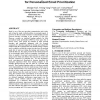Free Online Productivity Tools
i2Speak
i2Symbol
i2OCR
iTex2Img
iWeb2Print
iWeb2Shot
i2Type
iPdf2Split
iPdf2Merge
i2Bopomofo
i2Arabic
i2Style
i2Image
i2PDF
iLatex2Rtf
Sci2ools
KDD
2009
ACM
2009
ACM
Mining social networks for personalized email prioritization
Email is one of the most prevalent communication tools today, and solving the email overload problem is pressingly urgent. A good way to alleviate email overload is to automatically prioritize received messages according to the priorities of each user. However, research on statistical learning methods for fully personalized email prioritization (PEP) has been sparse due to privacy issues, since people are reluctant to share personal messages and importance judgments with the research community. It is therefore important to develop and evaluate PEP methods under the assumption that only limited training examples can be available, and that the system can only have the personal email data of each user during the training and testing of the model for that user. This paper presents the first study (to the best of our knowledge) under such an assumption. Specifically, we focus on analysis of personal social networks to capture user groups and to obtain rich features that represent the socia...
Data Mining | Email Overload Problem | Enriched Vector Representation | KDD 2009 | Personal Email Data |
| Added | 25 Nov 2009 |
| Updated | 25 Nov 2009 |
| Type | Conference |
| Year | 2009 |
| Where | KDD |
| Authors | Shinjae Yoo, Yiming Yang, Frank Lin, Il-Chul Moon |
Comments (0)

